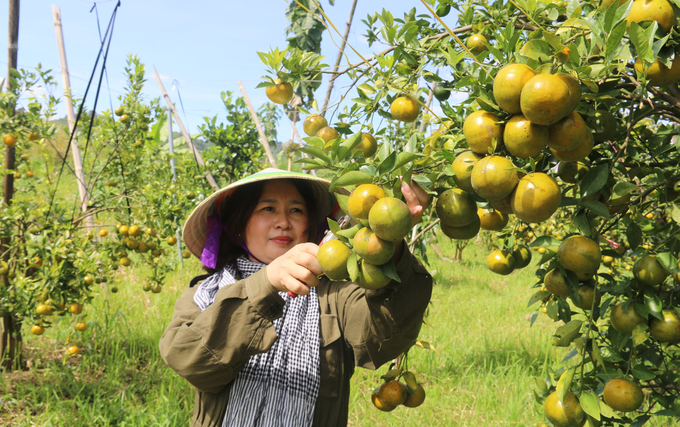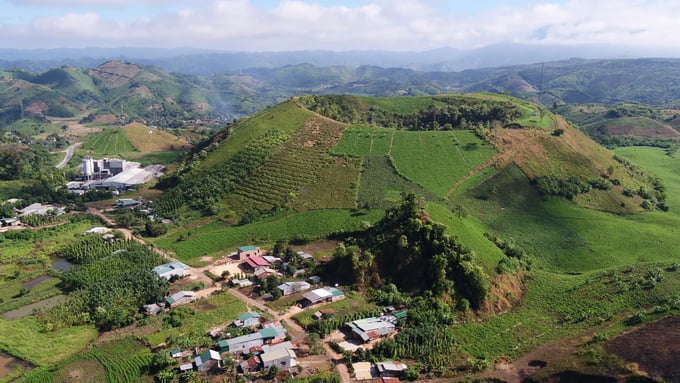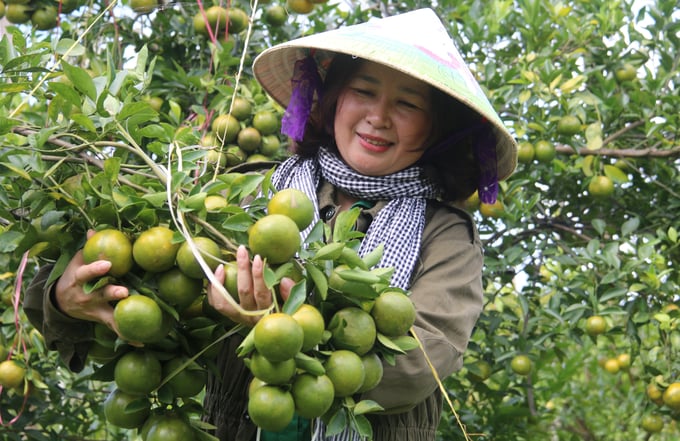June 16, 2025 | 06:12 GMT +7
June 16, 2025 | 06:12 GMT +7
Hotline: 0913.378.918
June 16, 2025 | 06:12 GMT +7
Hotline: 0913.378.918
In the early days of November, tourists visiting the orange and tangerine farm belonging to Ms. Nguyen Thi Mai in Phu Thuan village, Quang Phu commune, Krong No district, Dak Nong province could not help but be surprised at the abundance of fruits in the farm. This area is unique thanks to its location at the foot of Nam Kar volcano where laterite is extremely prominent.

Ms. Mai's fruit-laden tangerine trees at the foot of the volcano.
The land at Nam Kar volcano, Quang Phu commune is considered to house the harshest climate in Dak Nong. Most visitors to the area would not be able to imagine a large land with grass growing overhead, in addition to yielding more than 100 tons of oranges and tangerines every year. These agricultural products are sold at a price 2 to 3 times higher compared to the market price.
According to Ms. Mai, while working as a purchasing focal point for agricultural products in Dak Mil district, Dak Nong province in 2016, she decided to quit her job to fulfill her passion of organic farming.
Ms. Mai said that after working as a purchasing focal point for agricultural products, traveling between the South and the North, she understood the limitations of traditional agricultural production. Farmers are often forced by traders to change the prices because they depend on the consumption market. That is what prompted Ms. Mai to switch from purchasing to farming.
“During my time as an agricultural product buyer, I had access to many Japanese customers. As a result, I know that the volcanic soil has plenty of minerals that can help plants grow strongly. In pursuit my dream, I went to Quang Phu commune to buy 4 hectares of farmland and got to work. When I first came here, the land was full of weeds. When local people learned that I intend to grow oranges and tangerines, they advised me to choose another tree to plant. Despite their words, I kept at it and even closed the farm at times without communicating with anyone, just to keep my thoughts from being swayed", recalled Ms. Mai.

The Nam Kar volcanic area has many minerals suitable for growing citrus fruits.
The area at the foot of the volcano contains only laterite so the cultivation of fruit trees faces many challenges. At the beginning, Ms. Mai had to carve each rock hole to plant trees; The farm only had a thin layer of soil, which is not enough for plants to grow.
“Lava from the Nam Kar volcano turned this land lateritic. The laterite layer is thick, so the temperature during the dry season is extremely high; other than grass and lone bananas, no plant can withstand such heat to develop normally. After a lot of trial and error, I came up with a solution that is to create a layer of vegetation and add humus every year.
Afterwards, I would plant citrus at each rock crevice and let the grass grow. When the grass overgrows the tops of the orange and tangerine trees, I would start cutting, and then let it rot on the spot to create fertilizer. This helps protect the citrus trees from the heat and replenish the annual humus layer, On the other hand, this technique limits the evaporation of water in the soil”, Ms. Mai shared.
The female farmer added that she was determined from the beginning to follow organic and natural agricultural production, without relying on the use of chemical fertilizers. In order to have a suitable farming process, Ms. Mai sent a soil sample for analysis and learned that the soil here is rich in minerals, suitable for growing citrus trees.

The farm is grown organically at high quality, so its products are highly valued by the consumers.
For the first two years, the seedlings have to compete with the weeds to grow. Afterwards, any healthy tree will grow well and start to yield fruits by the 3rd year.
The first tangerines were harvested three years later. Seeing the results after 3 years of persistent care on the hot laterite layer, Ms. Mai was filled with emotions.
At that time, the concept of organic agricultural products was still unfamiliar to the people of Quang Phu commune, so it was difficult to sell a kilo of tangerines at the price of several tens of thousands of dong. Therefore, Mrs. Mai packaged a large box of tangerines and travelled to Hanoi alone to market her products.
"My initial intention when I travelled to Hanoi was to hear reviews about my products, then I would find an outlet for my citrus products. Fortunately, tangerines grown at the foot of the volcano have a very remarkable taste, strong sweetness and long shelf life because no chemicals were used in the production. As a result, the products were favored by many people", Ms. Mai happily said. She added that the land full of laterite and weeds has given fruits for 4 years so far.
Ms. Mai cooperates with consumers, including Japanese supermarkets in Vietnam, to put her oranges and tangerines on the shelves, with the selling price 2 to 3 times higher compared to the market price.

Ms. Mai established an organic agricultural cooperative, creating jobs for 52 local workers and helping people develop sustainable economy.
Ms. Mai believes that these high quality products are a proof and an affirmation of the values that the lava field brings. Based on the initial success, Ms. Mai established Quang Phu Organic Agriculture Cooperative in 2020 to help many households in the area develop their economy.
The cooperative currently has 52 members, annually supplying nearly 100 tons of fruits and 80 tons of vegetables to the market. Each person in the cooperative earn a monthly income ranging from 7 to 14 million VND.
Ms. Nguyen Thi Xuan in Phu Thuan village, Quang Phu commune, Krong No district shared that local people were only used to producing industrial crops in the past because of the dry weather, and the land was full of laterite, so the production efficiency was relatively low.
According to Ms. Xuan, local people have gradually changed their production methods and secured their output after joining the cooperative group.
“Our products depended heavily on traders in the past; Instead, our farmers are now producing according to placed orders. Products are consumed as soon as they are made, even at high prices at times if they can meet the quality standards. Thanks to organic production, the local people now have the capacity for economic development", said Ms. Xuan.
For her contribution in creating jobs and supporting local women in solving social problems from 2017 to 2022, Ms. Mai was awarded with a certificate of merit by the Central Committee of the Vietnam Women's Union. Her achievements were further commended when the products of Quang Phu Organic Agriculture Cooperative are certified by Dak Nong Provincial People's Committee as 4-star OCOP Products.
"Switching to agriculture was probably my boldest decision. But with what I have now, I am sure that the path I have chosen is the right one despite many difficulties", Ms. Mai shared.
Translated by Nguyen Hai Long
/2025/06/12/3721-2-202745_83.jpg)
(VAN) TH made an impression at Seoul Food 2025 with its line of natural beverages, paving the way for Vietnamese food products to enter the South Korean market.

(VAN) Soc Trang's success in rice exports stems from a strategy of developing fragrant and specialty rice cultivation areas and standardizing production toward low-emission practices.
/2025/06/11/1311-5-120811_839.jpg)
(VAN) The pig farming industry is facing the challenge of comprehensive restructuring to meet requirements for quality, safety, traceability, and market expansion both domestically and for export.

(VAN) Vietnam considers participating in ALGROALBA in order to expand agricultural production, coordinate the assessment and effective exploitation potential land.
/2025/06/05/5314-1-184727_407.jpg)
(VAN) From seemingly worthless fish scales and skin, enzymes and lactic ferments can transform by-products into peptides, opening a sustainable, effective business direction and elevating Vietnamese seafood.

(VAN) TTC AgriS and IFC signed a strategic partnership to develop a sustainable agricultural value chain, aiming to achieve the Net Zero target by 2035.

(VAN) Seafood by-products are opening a new path, combining green growth and technological innovation to enhance the industry's value.